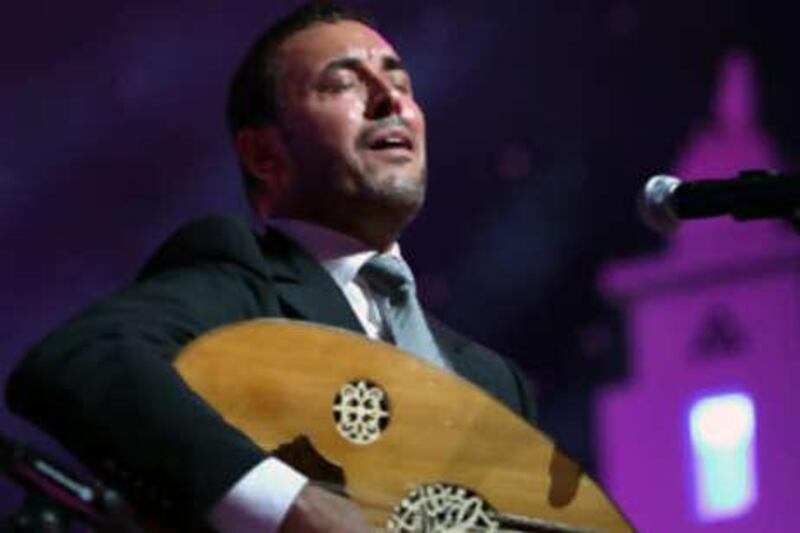ABU DHABI // Kazem al Saher sings for Iraq like a man in mourning, longing for the days when his country was a thriving hub of arts and culture, before war and poverty ravaged it. Speaking after his live performance on Abu Dhabi TV's Prince of Poets television programme at the Raha Beach Theatre last week, Saher - who has sold more than 30 million albums - says it is the children and the poor who have paid the highest price for the fighting in Iraq.
His songs, he says, are "from the tongues of children directed to the world and the people whose blood was shed in these [Iraqi] wars". Saher, who grew up in Nainawa, near Mosul in northern Iraq, began singing at the age of 12. Since he had no money, he traded his bicycle for a guitar and then took private lessons and surrounded himself with music. At 20, he enrolled in the once-prestigious and bustling Baghdad Music Academy, despite his father's hopes that he would follow a more conventional career.
After graduating in 1988, he recorded a pop song called A'abart Al Shat ("I went to the shore"), which gained him instant popularity. He went on to record many more hit singles, often using traditional instruments such as the oud, the nai (a flute), tabla, the daf (similar to a tambourine) and the qanoon (an instrument similar to a dulcimer, with 81 strings). Eventually, Saher turned his full attention to classical Arabic music, playing scales that had not been used in Iraqi music in several decades, helping to revitalise a tradition.
His career was hindered by the outbreak of the first Gulf War but he moved to Lebanon and began working vigorously on his music. It was here that he met the famous Syrian poet Nizar Qabbani and began one of the most important collaborations in Arabic music. Qabbani, who wrote songs for legendary singer Umm Kulthum, penned the lyrics to more than 30 of Saher's songs. In addition to Qabbani's poems, Saher sang both political and romantic songs about Iraq and Baghdad, highlighting the plight of his compatriots.
More recently, Saher has collaborated with Western stars such as Lenny Kravitz and Sarah Brightman to help to raise awareness about the plight of the thousands of Iraqi refugees. In 1998, his song Tathakkar, about children dying in the streets of Baghdad, won him a Unicef award and an invitation to work with the UN. He calls this one of his crowning moments: "This is to me better than anything else because my message is humanitarian."
The next year, he performed Tathakkar in the US in front of members of Congress and UN diplomats. Now, he says he concentrates on "Iraqi children and refugees living in tents, without homes". "They can't return to Iraq and they can't go to any other Arab countries. I am trying to raise awareness about it and I'm working with UNICEF in the hopes of helping them." His own family is now spread out around the region. His mother lives in Cairo and other relatives are in Syria, but his homesick brothers, he says, "could not stand being away even considering the circumstances".
It saddened him to see Iraq's arts community devastated by war. Many of the country's most established artists have left, moving to places such as Europe to pursue their careers. "So many of the music teachers left the country. In the 1970s when I was at the Baghdad Music Academy, the teachers were all very influential and involved in the country's music scene. "We had great advancements in literature and poetry as well but when the war happened, teachers started leaving and the students were left with nobody."
Those who stayed behind have had to turn to other careers to make ends meet. "People took one step forward and Iraq took one step back. They were banned from everything." Many of his contemporaries have also tried to make a difference through their art, voicing their despair at Iraq's violence and political situation. It is the "humanitarian" side of poetry that makes Prince of Poets such an important means of communication in a region rocked by political instability and humanitarian crises, he says.
"It is vital to encourage authors and poets. This is something big for me, to make the youth become affected and look into literature more and into our language more. "The language of poetry is humanitarian and humanitarian work in this day and age is very important. "To be concerned at this time with this humanitarian message and the message of literature is something magnificent." He now dreams of Iraq returning to its former glory, finding "peace and safety for Iraqis" so they can resume their normal lives.
"They might destroy the infrastructure in Iraq but I am proud that my country is a country of intellectuals and modernity and I think in the coming years it will be the most beautiful it ever was." @Email:mswan@thenational.ae





